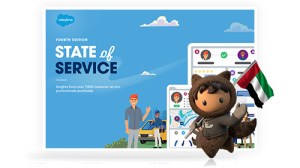Choosing the right key performance indicators (KPIs) is crucial for decision makers in the UAE who want to effectively measure and improve their customer service performance.
Since COVID-19, 89% of decision makers in the UAE have invested significantly in training their agents, versus a global average of 79%, the fourth State of Service report has found.

For the report, over 7,000 service leaders around the world were polled to weigh up how the pandemic has changed customer service priorities and delivery. And it reveals that customer service is a key battleground for UAE companies, with 89% of service decision makers saying field service drives significant revenue, versus 75% globally.
UAE service decision-makers have been more decisive in how they responded to rocketing case volumes from anxious customers since the start of the pandemic. For example, 89% of organisations in the UAE have invested in new service technology, versus 78% globally.
So, how are UAE businesses measuring the success of the service investments they’re making? And how are they maximising their performance?
5th KPI in the UAE: Customer Lifetime Value
In simple terms, this is the total revenue a company derives from an individual from the start to the end of their relationship with them. The longer and happier the relationship, the greater the value.
It may sound like an obvious metric to track, but it’s often neglected by service providers. Only 61% of decision-makers measure this KPI.
But it’s ignored at a company’s peril.
The correlation between customer service high performers (companies that rate their customer satisfaction as ‘excellent’) and those that measure this KPI is startling.
It’s the fourth most important KPI for companies that excel in customer service, with 72% of high performers tracking Customer Lifetime Value. In stark contrast, 59% of moderate performers (those that rate their customer satisfaction as ‘good’) and just 41% of underperformers (those with ‘poor’ satisfaction) track it.
The message is clear: companies that take a longer-term view of the customer journey and nurture closer partnerships with customers have higher levels of satisfaction.

When you consider that companies in the UAE place such importance in this KPI, it’s no surprise just how high the customer service bar has been set in this market.
One way these companies drive greater Customer Lifetime Value is by giving their service agents all the information they need at their fingertips, at the point of contact. The report shows 65% of UAE agents can find everything they need on one screen while serving a customer – compared to 49% globally.
This mutual understanding goes a long way when building such long-term relationships.
4th KPI in the UAE: First Contact Resolution Rate
Having a 360° view of your customer – like what Service Cloud affords – is crucial if you want to resolve a service issue at the first point of contact.
Being able to see information such as a customer’s full service and sales history, product preferences, and physical location empowers agents and personalises the relationship.
This can pay real dividends. Putting your customers at the centre of the relationship has a tangible impact on their propensity to purchase your goods or services again.
What’s more, since COVID-19 turned the world upside down, 59% of decision-makers say they have raised their customer service standards.
So, if the competition is upping their game – you need to stay on top of yours. And one way to do this is by resolving customer issues as quickly as possible.

3rd KPI in the UAE: Customer Retention
Globally, customer retention as a KPI saw a huge increase in use between 2018 and 2020.
And it’s clear to see why.
In times of economic crisis, customer retention is paramount. And the power of great service to retain customers and build stronger relationships is well-known.
In fact, 86% of agents working at high-performing service providers said management was more appreciative of the strategic value of service during the pandemic. In underperforming companies, that number was just 59%.
Incentivising agents is also crucial: 89% of agents in high-performing companies said they saw a direct link between their work and business performance, compared to 61% of agents in underperforming companies.

Rising customer expectations in the UAE are accelerating the use of AI and CRM platforms. These solutions improve customer relations and let agents find speedy answers and resolutions. This means the question for companies in the UAE is no longer “Can I afford to invest in service technology?” It’s “can I afford not to?”
2nd KPI in the UAE: Revenue
Excellent customer service is no longer nice to have. In recent years, the direct link between service and company revenue has been cemented. As the global economy contracts, excellent service is a must.
In the UAE, as in the rest of the world, revenue has become the second most important KPI of service delivery: 80% of service organisations now track it, up from just 51% in 2018.
This is the greatest increase of any of the metrics tracked. And it’s hugely significant. Service has been elevated in the minds of decision-makers as a key factor in delivering revenue. It requires the same prioritisation and investment as other key company functions, such as sales, production, and logistics.
It’s also key to remember that – in spite of the restrictions on movement caused by the global pandemic – the personal touch is still highly valued by customers.
Globally, 70% of consumers say they still prefer in-person service appointments over alternatives. And in the UAE, 89% of decision-makers say field service drives significant company revenue (compared to a global average of 75%).
Clearly, field service agents need the right technology and information at their fingertips to deliver excellent customer service.

1st KPI in the UAE: Customer Satisfaction
It comes as no surprise that customer satisfaction is king of the service KPIs in the UAE.
As the world changes and technology advances, customers are demanding more. And maintaining high levels of satisfaction is a perennial task.
No one can afford to take their eye off the ball. Technologies such as AI are driving new efficiencies, which let high-performing service providers swiftly solve service issues at the first point of contact.
Of course, protocols and policies are essential for successful businesses. But, increasingly, so is giving service agents the flexibility to quickly and efficiently deal with issues. This flexibility relies on clarity of information, encouragement, and training.
Another metric that is becoming increasingly important for service providers the world over is customer effort. This metric reflects how easy it is for a customer to ask for and receive service.
As communication technologies advance, customer expectations will increase. They will demand effortless service experiences that resolve issues quickly. And technology will be key to this.
One thing is clear: customer effort as a KPI of service will become more important in the coming years.
If you want to see more about how service leaders in the UAE (and around the world) are measuring success, using technology, and preparing for the future, read the full State of Service report.
























